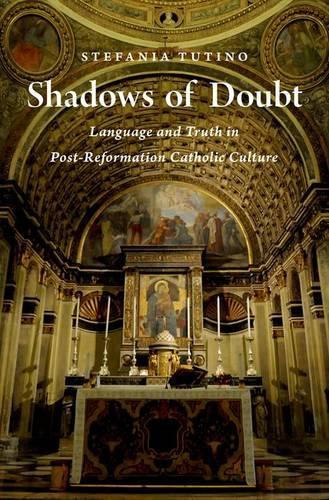Full Product Details
Author: Stefania Tutino (Professor of Early Modern History, Professor of Early Modern History, UCLA)
Publisher: Oxford University Press Inc
Imprint: Oxford University Press Inc
Dimensions:
Width: 16.00cm
, Height: 2.80cm
, Length: 23.60cm
Weight: 0.544kg
ISBN: 9780199324989
ISBN 10: 0199324980
Pages: 304
Publication Date: 30 January 2014
Audience:
College/higher education
,
Professional and scholarly
,
Undergraduate
,
Postgraduate, Research & Scholarly
Format: Hardback
Publisher's Status: Active
Availability: To order

Stock availability from the supplier is unknown. We will order it for you and ship this item to you once it is received by us.
Reviews
This highly original and brilliantly argued study of the way in which truth claims were made and debated in post-Reformation Catholic culture is the work of a world-class scholar at the very top of her game. Tutino has not only made an indispensable contribution to the history of early modern skepticism and doubt, but has also recovered for attention the early modern origins of 'post-modern' awareness of the fragile relationship between truth and language. As such, her book will be required reading not only for historians of early modern Roman Catholicism but also for students of literature and philosophy of language more generally. --Simon Ditchfield, Reader in History, University of York Post-Reformation Catholicism emerges from the pages of Shadows of Doubt as a far more complex, intellectually richer movement than the one that we have known. Whereas past scholarship tends to emphasize the solid certainties of post-Reformation Catholicism, Shadows of Doubt reveals the 'dark side' of the story: a world in which the unquestioned truth of theology existed together with grave doubts about the link between human language and reality. --Ronald Witt, Professor Emeritus of History, Duke University Tutino deftly overturns stereotypes by exploring the pre-modern antecedents of post modernity. She gives us an Age of Faith less closed in its convictions because it remains remarkably open in its sense of how God speaks Truth. As a globalizing Catholicism grapples with many new languages and cultures, her authors explore the limits of language, and face questions of doubt that arise when all language becomes suspect-perhaps even God's. --Nicholas Terpstra, Professor of History, University of Toronto
This highly original and brilliantly argued study of the way in which truth claims were made and debated in post-Reformation Catholic culture is the work of a world-class scholar at the very top of her game. Tutino has not only made an indispensable contribution to the history of early modern skepticism and doubt, but has also recovered for attention the early modern origins of 'post-modern' awareness of the fragile relationship between truth and language. As such, her book will be required reading not only for historians of early modern Roman Catholicism but also for students of literature and philosophy of language more generally. Simon Ditchfield, Reader in History, University of York
Author Information
Stefania Tutino received her Ph.D. from the Scuola Normale Superiore, Pisa, in 2003. She was previously a professor in the Departments of History and Religious Studies at UCSB. Now, she is a Professor of Early Modern History at UCLA. Her research focuses on the intellectual, political, and cultural history of early modern Catholicism.




